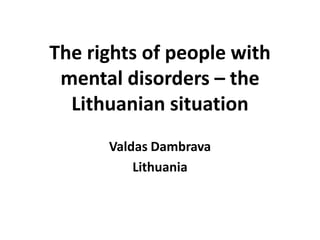
9 The rights of people with mental disorders – the Lithuanian situation
- 1. The rights of people with mental disorders – the Lithuanian situation Valdas Dambrava Lithuania
- 2. What is their situation? • Terrible...
- 3. Article in LT mass media Patent with mental illnesses threatened to burst up a house and hit a policemen
- 4. Invisible people? • There were no sex, prostitution, drugs, gays, disabled etc. in Soviet Union... • We still do not know how to treat them. • Disabled people closed in ghettoes. • Very bad image of disabled people. • Soviet tradition: elimination from society through mental hospitals .
- 5. Research • Absolute majority does not tend to discriminate people with hearing, vision, movement disability. • Nevertheless less respondents are tolerant to people with mental disability: only half of respondents would communicate with them like other ordinary people • Absoliuti dauguma gyventojų bendraudama nėra linkusi diskriminuoti žmonių su regėjimo, klausos arba judėjimo negalia: jie teigia, kad su šių neįgaliųjų grupių atstovais bendrauja kaip su bet kuriais kitais žmonėmis. Tačiau kiek mažiau respondentų tolerantiški psichiškai neįgaliems žmonėms: tik apie pusė respondentų bendrautų su jais kaip su kitais žmonėmis.
- 6. • That exceptional attitude to people with mental disability was proved by the fact, that respondents would support use of more strict limitations (restrictions) for mentally disabled people. Half of respondents agree to strict isolation of mentally disabled people. More than half support an idea of forced treatment of mentally disabled. • Tokį išskirtinį požiūrį į psichiškai neįgalius patvirtina ir respondentų požiūris į griežtesnių apribojimų taikymą psichiškai neįgaliems. Didelė dalis apklaustųjų (apie pusė) pritartų griežtesniam turinčių psichikos negalią asmenų izoliavimui. Dar daugiau norinčių, kad būtų taikomas priverstinis gydymas.
- 7. • Opinion of Lithuanians: working conditions, as well as conditions of transportation for disabled people is very bad. Worst of all were evaluated conditions of mentally disabled people and people with moving disorders. • Lietuvos gyventojai kritiškai vertina darbo sąlygas neįgaliesiems ir kaip itin blogas vertina transporto sąlygas žmonėms su judėjimo negalia. Blogiausiai vertinama psichikos ligonių ir turinčių judėjimo negalią padėtis. Ypač blogai vertinamos neįgaliųjų darbo galimybės ir sąlygos.
- 8. • Situation (rights of disabled people) over last years has slightly improved. • Nepaisant vertinimų, kad per pastaruosius metus neįgaliųjų teisių gynimas labiau pagerėjo negu pablogėjo, visose gyvenimo sferose neįgaliųjų padėtis buvo įvertinta kaip greičiau bloga. Tik maža dalis respondentų vertina neįgaliųjų teisių padėtį greičiau gerai, o du trečdaliai ją vertina greičiau blogai.
- 9. • Critics to the activities of State institutions, business companies as far as rights of disabled people is concerned. • Good evaluation of NGO‘s, mass media, international organizations. • Respondentai kritiškai vertina valstybinių ir verslo institucijų veiklą, ginant neįgaliųjų teises Lietuvoje, bet gerai vertina žiniasklaidos, tarptautinių ir nevyriausybinių organizacijų veiklą.
- 10. Part of disabled people in different age group, % (conditions for multiple discrimination?)
- 11. Conditions of mentally disabled people, good/bad evaluation: work, education, leisure, culture/sports, public transport, political life
- 12. • Mental illness is a disorder which effects feelings and behavior. • 25% of all people at certain period of their life experience disorders of their mind and behavior. Almost all mental diseases manifest only certain time and can be successfully cured with medicaments • Psichikos liga yra sutrikimas, kuris veikia jausmus ir elgesį. • 25% žmonijos tam tikru gyvenimu laikotarpiu patiria psichikos ar elgesio sutrikimų. Beveik visos psichikos ligos pasireiškia tam tikrą laiką ir gali būti sėkmingai gydomos vaistais.
- 13. Thank you for your attention
